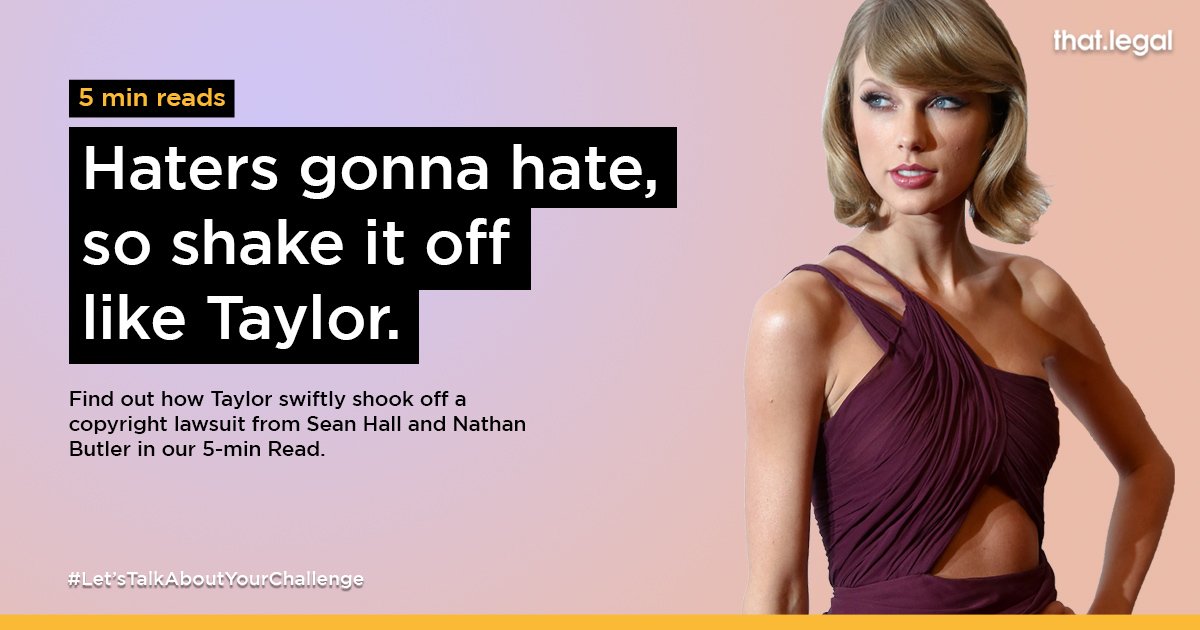Haters gonna hate, so shake it off like Taylor
Introduction
We are about 5 months away from Taylor Swift performing live in Singapore! In our previous article featuring her, we discussed Taylor’s Version and how it came to be. This time, we will delve into another one of the IP controversies that the star found herself embroiled in: A copyright infringement lawsuit alleging that the lyrics from one of her hit singles, Shake It Off, was stolen from an earlier song.
The Dispute
In 2017, two songwriters, Sean Hall and Nathan Butler, sued Taylor for copyright infringement, alleging that she stole the lyrics to her hit single “Shake It Off” from their song, “Playas Gon’ Play” (released in 2001 by R&B group 3LW). The specific objection related to the lines: “playas, they gonna play, and haters, they gonna hate” (from Playas Gon’ Play) and “players gonna play, play, play, play, play and the haters gonna hate, hate, hate, hate, hate” (from Shake It Off).
In response, Taylor claimed that she had never heard the song “Playas Gon’ Play” before. She did say that she had heard the phrases “players gonna play” and “haters gonna hate” but understood them to mean that one can or should shrug off negativity.
The case was initially heard by Judge Fitzgerald of the U.S District Court in L.A, and he dismissed it. He held that the lyrics from Playas Gon’ Play, which Hall and Butler claimed were protected by copyright, were “short phrases that lack the modicum of originality and creativity required for copyright protection”. Further, he opined that “the concept of actors acting in accordance with their essential nature is not at all creative… It is banal”. The Judge also noted that many other songs made similar references to players and haters – “Dreams” by Fleetwood Mac (“Players only love you when you’re playing”) and “Playa Hater” by the Notorious B.I.G (“There are two kinds of people in the world today. We have the playas, and we have the playa haters”).
On appeal in 2019, a panel of judges found that the district court had “constituted itself as the final judge of the worth of an expressive work”, a decision that should have been made by a jury. Therefore, they sent the case back to the district court to be heard.
Taylor’s lawyers filed to dismiss the case on the grounds that Hall and Butler did not have the requisite legal standing to launch the lawsuit. They had granted their music publishers the exclusive rights to bring an infringement lawsuit over the song, and the said publishers had refused their request to sue.
However, the judge denied the request to dismiss the case, and after some more back and forth, he finally scheduled the trial to be heard in January 2023. It appears that Taylor managed to strike a deal with Hall and Butler because in December 2022, both sides filed to dismiss the action in its entirety.
Copyright Lessons
First, Judge Fitzgerald in making his initial ruling, gave weight to the fact that other songs have lyrics that are similar to the allegedly infringing lyrics – This factor might not hold the same amount of sway if the case was litigated in Singapore. In our view, it is likely that the Courts in Singapore would refer to the idea/expression dichotomy and treat the idea that “players are going to play” and/or that “haters are going to hate” as incapable of copyright protection, thereby achieving the same result, albeit through different reasoning.
Second, the rights associated with a copyrighted work may be contractually assigned to someone else. If you are an artist, no matter what type of art (e.g. visual or vocal), it would be prudent to understand the implications of signing any sort of contract, whether publishing, licensing, or distribution. Though Taylor failed to have the case summarily dismissed (for lack of standing), the argument itself was a sound one and could have succeeded at trial. This may have been the leverage that caused the case to settle out of court.
Conclusion
In one of her comments to the press, Taylor mentioned that “With Shake It Off, [she] wanted to provide a comedic, empowering approach to helping people feel better about negative criticism through music, dance, and the personal independence enabling one to just shake off the negative criticism”. Well, all we can say is that she certainly shook off this lawsuit in an expedient (or should we say Swift) manner.
Follow us on social
If you like our content and would like to receive our updates in a timely manner, follow us on your favourite social platforms.
Related Content
Disclaimer
This article does not constitute legal advice or a legal opinion on any matter discussed and, accordingly, it should not be relied upon. It should not be regarded as a comprehensive statement of the law and practice in this area. That.Legal LLC represents neither party in this dispute and is not privy to any confidential information pertaining to the parties. All facts stated herein are compiled from publicly available sources. If you require any advice or information, please speak to a practicing lawyer in your jurisdiction. No individual who is a member, partner, shareholder or consultant of, in or to any constituent part of That.Legal LLC accepts or assumes responsibility, or has any liability, to any person in respect of this article.




